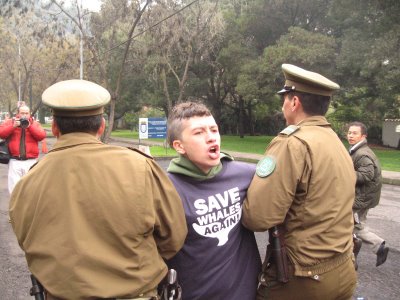Fifteen people were arrested by police at a meeting of the International Whaling Commission (IWC), held this year in Santiago, Chile.

Fifteen people were arrested by police at a meeting of the International Whaling Commission (IWC), held this year in Santiago, Chile. The protesters were supposedly trying to ‘storm’ the meeting but other reports state that the mere presence of people in front of the meeting’s venue was seen as a ‘security threat’.
The IWC meets annually to regulate the whaling industry and make decisions on conservation of whale populations. So far the meeting hasn’t reached any agreements and the commission continues to be strongly devided between the pro- and anti-whaling nations. Skye Bortoli, an activist from Teens Against Whaling described the meeting this year as ‘pathetic’, saying “this body will be known in the future as a small group of ecologically arrogant people who are condemning the world’s whales to agony and oblivion for petty politics and a few lousy bucks.”
Related Audio: Sea Shepherd Captain Paul Watson Talks in London | Interview With Nottingham Activist On Return From Whale Saving Mission
Related Newswire: Iceland Defies Moratorium On Commercial Whaling – Whale Hunt Started | Norway Starts Whale Hunting Season
Previous Features: Armed Canadian Coast Guard Storms Conservation Vessel | Nottingham Activist Returns From Whale Saving Mission In Antartica | Injured Among Sea Shepherd Crew As Japanese Military Open Fire | Activists Held Hostage By Japanese Whalers In Southern Ocean
Links: IWC official website | Wikipedia on IWC | Teens Against Whaling | Sea Shepherd Conservation Society | Greenpeace | Santiago Indymedia | Indymedia Ocean Defence
This year, like many a year before, the IWC fails to make progress in their protection of whales. Japan and other pro-whaling nations push for a partial lifting of the ban on commercial whaling. Also, the US (which has been involved with Japan’s whaling industry) has been pushing for the regulation of ‘scientific whaling’, something which conservations argue would only legitimize an already illegal activity. Japan uses the ‘scientific research’ as a smokescreen for their illegal commercial whaling practices.
There has been a debate about whether Greenland should be allowed a bigger quota of whales for their hunt and discussions are ongoing about Japan’s hunt in the Southern Ocean. It has been reported that the earliest the IWC might come to some kind of agreement is by next year’s meeting, which is to be held in Madeira, Portugal. The commission continues to be strongly divided between pro-whaling (Japan, Denmark, Norway, Iceland) and anti-whaling (Australia, United Kingdom, New Zealand, South Africa) nations.
Captain Paul Watson, from the Sea Shepherd Conservation Society, did manage to get into the hotel this year. He normally never makes it inside as the Sea Shepherd is the only organisation officially banned from attending IWC meetings. Paul, like Skye Bortoli, isn’t impressed with the state of affairs at this year’s meeting: “There were many things that could come out of this meeting. Japan could withdraw from the IWC and become a renegade whaling nation along with their partners in conservation crime Norway and Iceland. Or a compromise may be brokered that will allow the Japanese to withdraw from the Southern Ocean without losing face or thirdly, and most likely, nothing will come out of this meeting at all. From the way things are going so far it looks like Sea Shepherd will be returning to the Southern Ocean to once again enforce the regulations that the IWC and the nations of the world refuse to uphold. Oh well, I come to these meetings with no expectations hoping to be pleasantly surprised. After more than three decades I am still waiting.“
Greenpeace was also present in Chile, with a dominant presence among the various anti-whaling NGO’s and conservationists. Dave writes on the Greenpeace blog: “We hope something good comes out of these meetings, and that the commission transforms itself into a body that protects the whales and not the whalers. While commissioners sit in rooms talking, whales are still dying in the Southern Ocean and around the world from commercial whaling, ship strikes, sonar-related deaths, netting and pollution, amongst other human-induced hazards.”
On a positive note, Chile, the host of this year’s meeting has declared a permanent ban on whaling in its waters. Speaking at a former whale processing plant that Chile closed in 1967, President Michelle Bachelet said she sent a bill to Congress proposing a whale sanctuary along Chile’s coastline and declared the whale a national monument.

